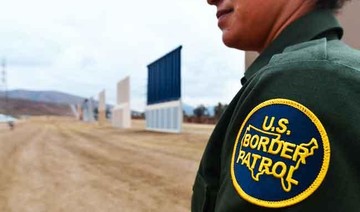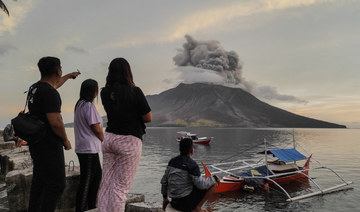The Trump administration’s move to separate immigrant parents from their children on the US-Mexico border has grabbed attention around the world, drawn scorn from human-rights organizations and overtaken the immigration debate in Congress.
It’s also a situation that has been brewing since the week President Donald Trump took office, when he issued his first order signaling a tougher approach to asylum-seekers. Since then, the administration has been steadily eroding protections for immigrant children and families.
“They’re willing to risk harm to a child being traumatized, separated from a parent and sitting in federal detention by themselves, in order to reach a larger policy goal of deterrence,” said Jennifer Podkul, director of policy at Kids in Need of Defense, which represents children in immigration court.
To those who work with immigrants, the parents’ plight was heralded by a series of measures making it harder for kids arriving on the border to get released from government custody and to seek legal status here.
The administration says the changes are necessary to deter immigrants from coming here illegally. But a backlash is mounting, fueled by reports of children being taken from mothers and distraught toddlers and elementary school age children asking, through tears, when they can see their parents.
About 2,000 children had been separated from their families over a six-week period ending in May, administration officials said Friday.
Among the parents caught up in the new rules is 29-year-old Vilma Aracely Lopez Juc de Coc, who fled her home in a remote Guatemalan village after her husband was beaten to death in February, according to advocates. When she reached the Texas border with her 11-year-old son in May, he was taken from her by border agents, she said.
Her eyes swollen, she cried when she asked a paralegal what she most wanted to know: When could she see her son again?
“She did not know what was going on,” said paralegal Georgina Guzman, recalling their conversation at a federal courthouse in McAllen, Texas.
Similar scenarios play out on a daily basis in federal courtrooms in Texas and Arizona, where dozens of immigrant parents appear on charges of entering the country illegally after traveling up from Central America. More than the legal outcome of their cases, their advocates say, they’re worried about their children.
Since Trump’s inauguration, the administration has issued at least half a dozen orders and changes affecting immigrant children, many of them obscure revisions. The cumulative effect is a dramatic alteration of immigration policy and practice.
The measures require a senior government official to sign off on the release of children from secure shelters and allow immigration enforcement agents access to information about sponsors who sign up to take the children out of government custody and care for them.
The crackdown expanded in April, when the administration announced a “zero tolerance” policy on the border to prosecute immigrants for entering the country illegally in the hopes they could be quickly deported and that the swift deportations would prevent more people from coming.
Parents are now being arrested and placed in quick federal court proceedings near the border. Since children cannot be jailed in federal prisons, they’re placed in shelters that have long existed for unaccompanied immigrant children arriving on the border alone.
The administration insists the new rules are necessary to send a message to immigrants.
“Look, I hope that we don’t have to separate any more children from any more adults,” Attorney General Jeff Sessions said last week. “But there’s only one way to ensure that is the case: It’s for people to stop smuggling children illegally. Stop crossing the border illegally with your children. Apply to enter lawfully. Wait your turn.”
Immigration on the southwest border has remained high since the zero-tolerance policies took effect. Border agents made more than 50,000 arrests in May, up slightly from a month earlier and more than twice the number in May 2017. About a quarter of arrests were families traveling with children.
In addition to those trying to cross on their own, large crowds of immigrants are gathered at border crossings each day to seek asylum. Some wait days or weeks for a chance to speak with US authorities. On a Texas border bridge, parents and children have been sleeping in sweltering heat for several days awaiting their turn.
Under US law, most Mexican children are sent back across the border. Central American and other minors are taken into government custody before they are mostly released to sponsors in the United States.
The arrival of children fleeing violence in Central America is not new. President Barack Obama faced an even larger surge in border crossings that overflowed shelters and prompted the authorities to release many families. Nearly 60,000 children were placed in government-contracted shelters in the 2014 fiscal year.
Obama administration lawyers argued in federal court in Los Angeles against the separation of parents and children and in favor of keeping in family detention facilities those deemed ineligible for release.
Immigrant and children’s advocates said the new measures are not only cruel but costly. They argued that children fleeing violence and persecution in El Salvador, Guatemala and Honduras will continue to come to the United States and remain in government custody longer, costing taxpayers more money.
The government pays more than $1 billion a year to care for unaccompanied immigrant children, Sessions has said.
In May 2014, the average length of stay for children in custody was 35 days. So far this fiscal year, it’s taking 56 days for children to be released to sponsors — in most cases, their own relatives.
Many children were released to sponsors who did not have legal immigration status. That’s yet another concern child advocates now have since the Trump administration is requiring fingerprints of sponsors and their household members and will turn that data over to the immigration agency in charge of deportations.
Advocates say the new information sharing might lead some parents to shy away from sponsoring their own children and ask others to do so, a situation that can lead to cases of trafficking or neglect.
Simon Sandoval-Moshenberg, legal director of the immigrant advocacy program at the Legal Aid Justice Center in Virginia, said he’s never worked with immigrants who said US policies influenced their decision to move. They are fleeing violence and persecution, and he doesn’t see that changing even if the government deports parents.
“Look six months out from now,” he said. “Are these moms going to stay in Guatemala? Hell no, they’re going to come back looking for their kids.”
Erosion of immigrant protections began with Trump inaugural
Erosion of immigrant protections began with Trump inaugural
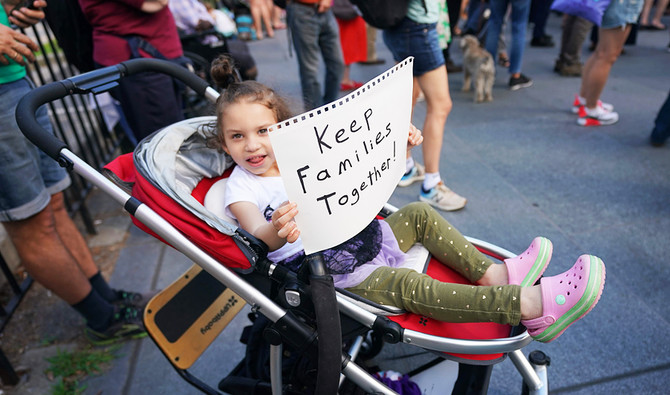
- The US administration says the changes are necessary to deter immigrants from coming to America illegally
- Six months out from now are these moms going to stay in Guatemala? Hell no, they’re going to come back looking for their kids, says lawyer
India’s foreign minister rejects Biden’s ‘xenophobia’ comment

NEW DELHI: Indian foreign minister Subrahmanyam Jaishankar rejected US President Joe Biden’s comment that “xenophobia” was hobbling the South Asian nation’s economic growth, The Economic Times reported on Saturday.
Jaishankar said at a round table hosted by the newspaper on Friday that India’s economy “is not faltering” and that it has historically been a society that is very open.
“That’s why we have the CAA (Citizenship Amendment Act), which is to open up doors for people who are in trouble ... I think we should be open to people who have the need to come to India, who have a claim to come to India,” Jaishankar said, referring to a recent law that allows immigrants who have fled persecution from neighboring countries to become citizens.
Earlier this week, Biden had said “xenophobia” in China, Japan and India was holding back growth in the respective economies as he argued migration has been good for the US economy.
“One of the reasons why our economy’s growing is because of you and many others. Why? Because we welcome immigrants,” Biden said at a fundraising event for his 2024 re-election campaign and marking the start of Asian American, Native Hawaiian and Pacific Islander Heritage Month.
The International Monetary Fund (IMF) forecast last month that growth in Asia’s three largest economies would slow in 2024 from the previous year.
The IMF also forecast that the US economy would grow 2.7 percent, slightly brisker than its 2.5 percent rate last year. Many economists attribute the upbeat forecasts partly to migrants expanding the country’s labor force.
Philippine bishops instruct flock to pray for rain, heat relief
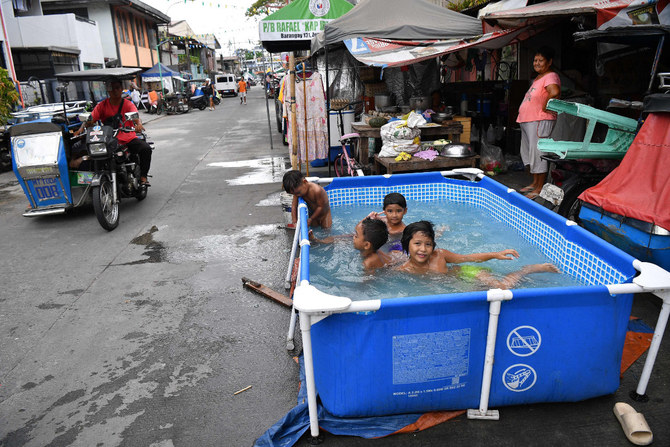
- Rising temperatures have forced the government to shut down tens of thousands of schools over the past week
- Increased demand has also stressed the country’s already strained power supply
MANILA: Catholic bishops in the Philippines are pitching in to seek divine relief from the extreme heatwave scorching the country, instructing their flock to recite special prayers for rain and lower temperatures.
Rising temperatures have forced the government to shut down tens of thousands of schools over the past week, while increased demand has stressed the country’s already strained power supply.
A widespread El Nino drought that began early this year is compounding the problem, ruining 5.9 billion pesos ($103 million) worth of farm produce so far according to the Department of Agriculture.
The Catholic Bishops Conference of the Philippines issued an “Oratio Imperata,” instructing parishes in the mainly Catholic nation to recite a prayer for deliverance from calamities during masses, according to the text seen by AFP on Saturday.
“We humbly ask you to grant us relief from the extreme heat that besets your people at this time, disrupting their activities and threatening their lives and livelihood,” the prayer read.
“Send us rain to replenish our depleting water sources, to irrigate our fields, to stave off water and power shortages and to provide water for our daily needs.”
A record-high 38.8 degrees Celsius (101.8 degrees Fahrenheit) was recorded in the capital Manila on April 27, forcing the closure of more than 47,000 schools for two days.
Nearly 8,000 schools remained shuttered as of Friday, the education department said, while the highest temperature in the country was recorded at 38.2C on the island of Mindoro south of the capital.
Indonesia to permanently relocate 10,000 people after Ruang volcano eruptions
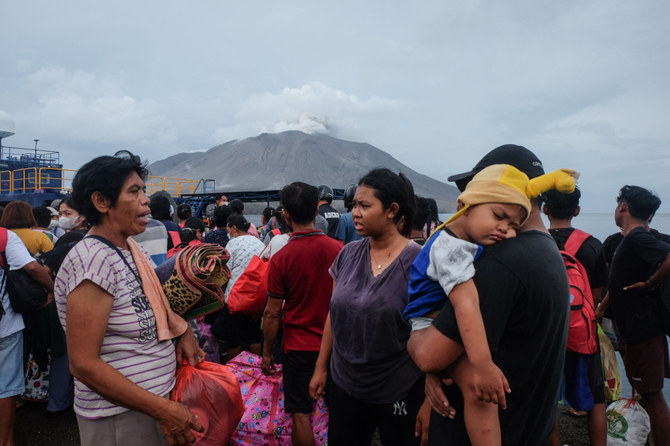
- Authorities warned of the a possible tsunami if parts of the mountain collapse into the surrounding waters
- Indonesia straddles the “Pacific Ring of Fire,” an area of high seismic activity where multiple tectonic plates meet
JAKARTA: The Indonesian government will permanently relocate almost 10,000 residents after a series of explosive eruptions of the Ruang volcano has raised concerns about the dangers of residing on the island in future, a minister said on Friday.
About 9,800 people live on Ruang island, in the province of North Sulawesi, but in recent weeks all residents have been forced to evacuate after the mountain has continued to spew incandescent lava and columns of ash kilometers into the sky.
Authorities this week raised the alert status of the volcano to the highest level, closed the provincial airport in Manado, and also warned of the a possible tsunami if parts of the mountain collapse into the surrounding waters.
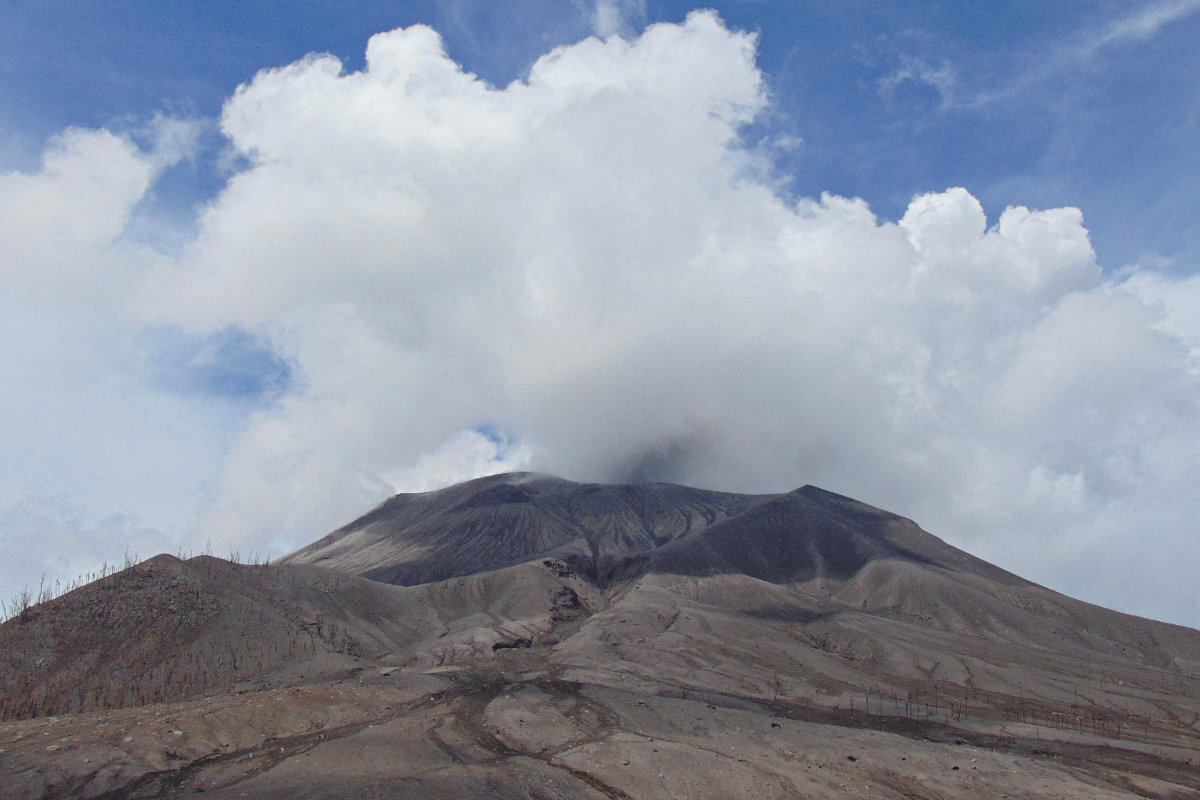
Hundreds of “simple but permanent” homes would be built in the Bolaang Mongondow area to facilitate the relocations, said coordinating human development minister Muhadjir Effendy, after a cabinet meeting to discuss the volcano on Friday.
“As instructed by President Joko Widodo, we will build houses that meet disaster-standards,” he said, adding that the site was located about 200 km (125 miles) from Ruang island.
Mount Ruang began to dramatically erupt last month, with experts saying the eruptions were triggered by increased seismic activity, including deep sea earthquakes.
The mountain erupted again on Tuesday, causing damage to some homes and forcing residents to evacuate from the Tagulandang island, where they had initially sought refuge, to the provincial capital of Manado.
Roads and buildings on Tagulandang were blanketed in a thick layer of volcanic ash, and the roofs of some homes had collapsed, according a Reuters witness.
The volcano had not erupted on Friday but Manado’s Sam Ratulangi Airport remained closed until the evening due to the spread of volcanic ash.
Indonesia straddles the so-called “Pacific Ring of Fire,” an area of high seismic activity where multiple tectonic plates meet.
US congressman praises heckling of war protesters, including 1 who made monkey gestures at Black woman
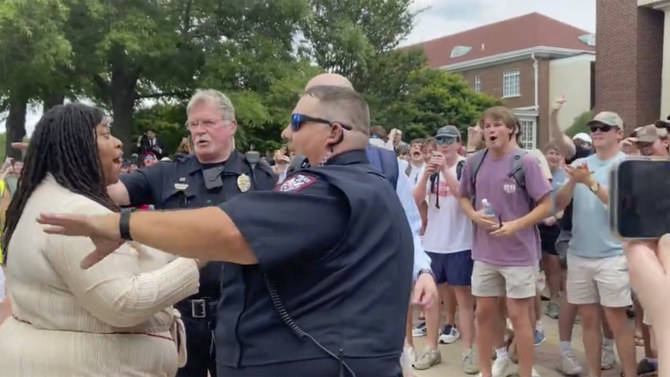
JACKSON, Mississippi: Israel-Hamas war demonstrations at the University of Mississippi turned ugly this week when one counter-protester appeared to make monkey noises and gestures at a Black student in a raucous gathering that was endorsed by a far-right congressman from Georgia.
“Ole Miss taking care of business,” Republican US Rep. Mike Collins wrote Friday on the social platform X with a with a link to the video showing the racist jeers.
The Associated Press left voicemail messages for Collins on Friday at his offices in Georgia and Washington and sent an email to his spokesperson, asking for an explanation of what Collins meant. There was no immediate response.
The taunting brought sharp criticism on and off campus.
“Students were calling for an end to genocide. They were met with racism,” James M. Thomas, a sociology professor at the University of Mississippi, wrote Friday on X.
The Rev. Cornell William Brooks, a former president and CEO of the NAACP and professor at the John F. Kennedy School of Government at Harvard University, wrote on X that a white man mocking a Black woman as a monkey “isn’t about ‘Stand With Israel’ or ‘Free Palestine.’ This is protest as performative racism.”
Collins was first elected to Congress in 2022 and made several social media posts criticizing campus protests.
Nobody was arrested during the demonstration Thursday at the University of Mississippi, where hecklers vastly outnumbered war protesters. According to a count by AP, more than 2,400 arrests have occurred on 46 US university or college campuses since April 17 during demonstrations against the war.
The student newspaper, The Daily Mississippian, reported about 30 protesters on the Oxford campus billed themselves as UMiss for Palestine. Videos and photos from the event showed the protesters were in a grassy area near the main library, blocked off by barriers erected by campus security.
They chanted “Free, free Palestine,” and carried Palestinian flags and signs with slogans including, “Stop the Genocide” and “US bombs take Palestine lives.”
Student journalist Stacey J. Spiehler shot video that showed campus police officers and the dean of students standing between anti-war protesters and hecklers. After the Black woman protesting the war had what appeared to be a heated exchange of words with several white hecklers, one of the men made the monkey gestures and noises at her.
About 76 percent of the university’s students were white and about 11 percent were Black in 2022-23, the most recent data available on the school’s website.
University of Mississippi Chancellor Glenn Boyce said the school is committed to people expressing their views. He said some statements made on campus Thursday were “offensive and unacceptable.”
Republican Gov. Tate Reeves reposted a video on X that showed counter-protesters on the campus singing “The Star-Spangled Banner.”
“Warms my heart,” Reeves wrote. “I love Mississippi!”
US campus protests wane after crackdowns, Biden rebuke
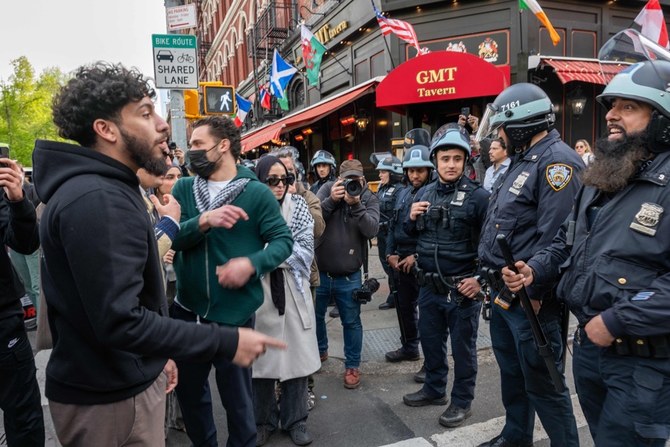
- More than 2,000 arrests have been made in the past two weeks across the US
NEW YORK: Pro-Palestinian protests that have rocked US campuses for weeks were more muted Friday after a series of clashes with police, mass arrests and a stern White House directive to restore order.
Police in Manhattan cleared an encampment at New York University after sunrise, with video posted to social media by an official showing protesters exiting their tents and dispersing when ordered to do so.
The scene appeared relatively calm compared to crackdowns at other campuses around the country — and some worldwide — where protests over Israel’s war against Hamas in Gaza have multiplied in recent weeks.
University administrators, who have tried to balance the right to protest and complaints of violence and hate speech, have increasingly called on police to clear out the demonstrators ahead of year-end exams and graduation ceremonies.
At the University of Chicago, law enforcement appeared set to dismantle an encampment Friday after the school’s president said talks with protesters on a compromise had failed.
Before the clearing operation began, dozens of American flag-wielding counter-protesters showed up and confronted the pro-Palestinian group, but police separated the two sides, local media reported.
More than 2,000 arrests have been made in the past two weeks across the US, some during violent confrontations with police, giving rise to accusations of use of excessive force.
President Joe Biden, who has faced pressure from all political sides over the conflict in Gaza, gave his first expansive remarks on the protests Thursday, saying that “order must prevail.”
“We are not an authoritarian nation where we silence people or squash dissent,” Biden said in a brief address from the White House.
“But neither are we a lawless country. We’re a civil society, and order must prevail.”
His remarks came hours after police moved in on demonstrators at the University of California, Los Angeles, which had seen a violent confrontation when counter-protesters attacked a fortified encampment there.
A large police contingent forcibly cleared the sprawling encampment early Thursday while flashbangs were launched to disperse crowds gathered outside.
Schools officials said that more than 200 people were arrested.
On the US East coast Thursday, protesters at New Jersey’s Rutgers University agreed to take down their camp after reaching a compromise with administrators — a similar deal to one made at Brown University in Rhode Island.
Republicans have accused Biden of being soft on what they say is anti-Semitic sentiment among the protesters, while he faces opposition in his own party for his strong support for Israel’s military offensive.
“There should be no place on any campus, no place in America for anti-Semitism, or threats of violence against Jewish students,” Biden said.
Education Secretary Miguel Cardona echoed the condemnation in a letter to university leaders on Friday, pledging to investigate reports of anti-Semitism “aggressively,” CNN reported.
Meanwhile, similar student protests have popped up in countries around the world, including in Australia, France, Mexico and Canada.
In Paris, police moved in to clear students staging a sit-in at the Sciences Po university.
An encampment has grown at Canada’s prestigious McGill University, where administrators on Wednesday demanded it be taken down “without delay.”
However, police had yet to take action against the site as of Friday.
The Gaza war started when Hamas militants staged an unprecedented attack on Israel on October 7 that resulted in the deaths of more than 1,170 people, mostly civilians, according to an AFP tally of Israeli official figures.
Israel estimates that 128 hostages remain in Gaza. The Israeli military says 35 of them are dead.
Israel’s retaliatory offensive has killed more than 34,600 people in Gaza, mostly women and children, according to the Hamas-run territory’s health ministry.



